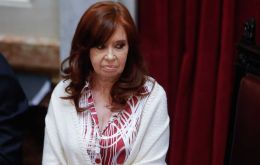MercoPress. South Atlantic News Agency
Argentina
-
Friday, July 17th 2020 - 07:27 UTC
Argentina suspends beef export to China from eight plants following on Covid 19 cases

Argentina’s food quality and safety body have suspended exports to China from eight meatpacking plants after cases of the novel coronavirus were detected among employees.
-
Wednesday, July 15th 2020 - 08:49 UTC
Ushuaia mystery: 57 sailors from fishing vessel infected with the virus after spending 35 days at sea

Argentina is trying to solve a medical mystery after 57 sailors were infected with COVID-19 after 35 days at sea, despite the entire crew testing negative before leaving port. The Echizen Maru fishing trawler returned to port after some of its crew members began exhibiting symptoms typical of Covid-19, the health ministry from Tierra del Fuego province said on Monday.
-
Tuesday, July 14th 2020 - 09:58 UTC
Approval of Argentine president pandemic policies eroding, but concern with the virus is still very strong

Approval of Argentine president Alberto Fernandez handling of the pandemic continued to slide during the last week and is at levels similar to those at the start of the quarantine, according to the latest opinion poll from Poliarquia made public over the weekend in Buenos Aires daily La Nacion.
-
Monday, July 13th 2020 - 09:58 UTC
Despite strict quarantine, Argentina exceeds 100,000 cases of Covid-19 infections

Argentina exceeded 100,000 cases of novel coronavirus infections on Sunday as it struggles to contain spiraling case rates despite an almost four-month strict quarantine imposed on the capital Buenos Aires and its surroundings. The health ministry said 2,657 new cases confirmed overnight took the total to 100,166.
-
Friday, July 10th 2020 - 09:00 UTC
Massive protests in Argentina demand justice and freedom; president Fernandez pledges to end “the serial haters”

Thousands took out to the streets in Argentina's capital Buenos Aires and the country's main cities with flags on Thursday, July 9th, Independence Day to protest pandemic restrictions for businesses, corruption, and magistrates decision to send under house arrest one of the most notorious characters of the country's corrupt practices in the awarding of public works contracts.
-
Friday, July 10th 2020 - 08:59 UTC
Two creditor groups not convinced with Argentina's latest offer, but admit it is in the right direction

Argentina’s US$65 billion debt restructuring talks teetered on the edge after two key creditor groups knocked back the country’s latest “final” offer, while the government signaled that there was no room left to improve the terms.
-
Thursday, July 9th 2020 - 09:55 UTC
Argentina with a daily record of Covid-19 cases, 3,604

Argentina posted a daily record of 3,604 confirmed cases of COVID-19 as the country grapples with rising infections that are threatening its early success in stalling the spread of the virus.
-
Wednesday, July 8th 2020 - 08:38 UTC
IMF praises Argentina's latest debt offer to creditors

A spokesperson for the International Monetary Fund said on Tuesday that Argentina’s latest debt offer to its creditors is “an important step” in the restructuring process.
-
Tuesday, July 7th 2020 - 10:10 UTC
An out of plan shock bomb goes off in Cristina Fernandez' backyard

The violent death of a former secretary of Argentine ex-president and currently vice president, Cristina Kirchner, in El Calafate, Santa Cruz province triggered a strong clash between the Argentine government and congressional opposition since there was speculation that Fabian Gutierrez, 48, a potential whistleblower in several corruption cases, had met his destiny to the hands of an alleged Kirchner conspiration.
-
Monday, July 6th 2020 - 09:40 UTC
Argentine journalists reject a new impulse of Cristina Kirchner's harassing habits

Three hundred Argentine journalists have made public a document rejecting claims from Vice-president Cristina Fernandez that several media professionals have colluded in an illicit association to spy on her.
